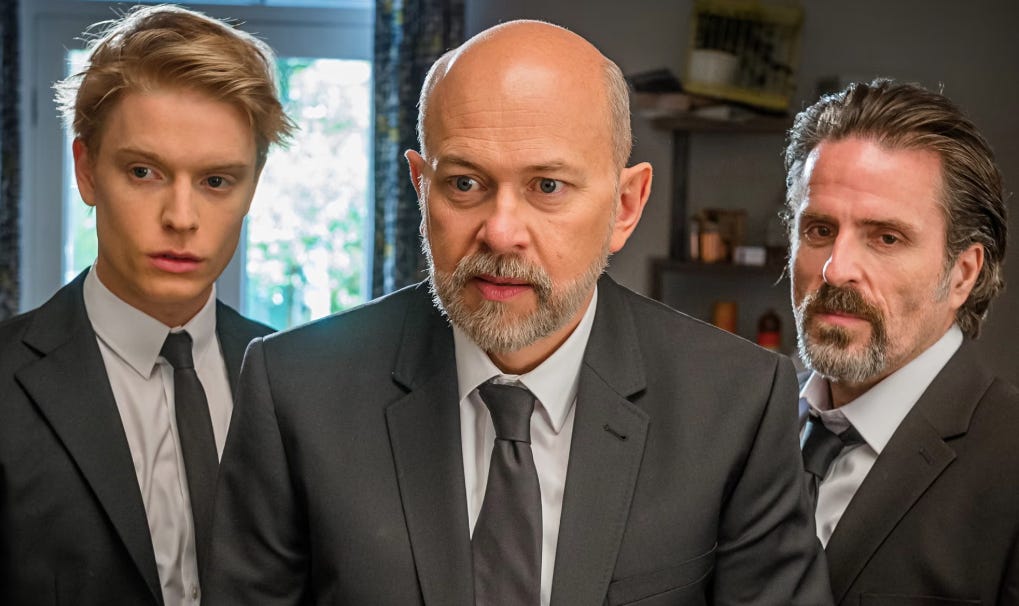
Russell T Davies reminded his followers on Instagram yesterday that it’s TEN YEARS since his brilliant Channel 4 series Cucumber aired in the UK.
Which reminded me of one of my favourite reviews, the one perhaps I’m most proud of. I went on a real journey with Cucumber, as you’ll see from the below. I wasn’t sure where he was going with it but, my god, never doubt RTD. His emotional bell always rings clear and true.
Here’s the review I wrote for the Guardian after the final episode.
On the Top Gear website, Jeremy Clarkson confesses, “When I meet someone I know to be homosexual, I can’t help staring at their bottom, wondering.” If he had watched Russell T Davies’ Cucumber (Channel 4) for the last eight weeks, the potential functions of a gay man’s bottom would have been nicely demystified for him. Perhaps he prefers to remain blissfully ignorant, distracted as he obviously is by all the gay buttocks. Each to his own.
Davies’ tumultuous drama thrust itself on to the screen in the same bawdy fashion as his first Manchester saga about the lives of gay men, Queer as Folk, did 15 years ago. But replacing the taut young flesh of the Canal Street regulars were the creaking hips and bad backs of a more grown-up gang. They sat around in wine bars, checking out the waiting staff on Grindr and talking endlessly about “cock”. I thought, after episode one, that I would be watching a midlife crisis in eight parts, with Vincent Franklin’s nuanced but unsympathetic Henry as its focus. I struggled to care about any of them and wondered why they were all so abrasive and tart. It lacked the usual underlying tenderness of Davies’s writing, but it turns out he was saving it for a truly magnificent ending.
From episode six, the brutal and unflinching story of Lance’s murder by an angrily repressed work colleague, who both wanted and abhorred the idea of sex with a man, utterly floored me. Davies, Cyril Nri (Lance) and James Murray (Daniel, the killer) handled that unbelievably difficult final scene with such mettle it was both breathtaking and extremely hard to watch. Episode seven followed with a long and stunningly well-paced scene set entirely in a stationary car. But it is in episode eight that Davies flexes his most impressive dramatic muscle as he pulls together the whole story with all the emotional complexity and honesty I had hoped for from the start. I’m sorry I ever doubted him.
In typical Doctor Who style, he ties up all those loose ends by way of time-travel with a touch of fairytale thrown in. In the final hour we dip into Henry’s life over almost eight years to see how and where he has ended up. His initial grief-avoidance ploy is to fill his and Lance’s former home with a “collective” of waifs and strays, many of them young and beautiful, with a fondness for performing slow-motion yoga in their pants in the sunlit garden. Or holding all-out raves in the disco-lit living room. This hyper-idyllic set-up is punctured by Henry’s sister Cleo (the wonderful Julie Hesmondhalgh) and Lance’s former work colleague Veronica (Anjli Mohindra) who gently and not so gently remind him he is going to have to deal with the guilt and grief eventually.
Then we flash forward six months and the collective has dispersed, leaving Henry alone with the looming trial verdict. Crucially, there is no court scene, no anguished family clutching each other in the public gallery as the verdict is read out. It’s all done with the beep of a smartphone notification and the silent hug of closure between Henry and Cleo; more effective than any Broadchurch cliffhanger.
The ease with which Davies leads you from misery to joy in this last hour is masterful. How he packs in the delayed stages of grief with so much other plot, character and narrative resolution is hard to grasp. Those moments, even months and years later, where grief catches Henry in the gut seem so utterly believable, like the torrent of invective he vomits down the phone to an unwitting cold-caller.
The unrelenting honesty of it sometimes stings like a paper cut. The bored Freddie’s ruthless upending of their domestic idyll with a few choice verbal javelins is devastating. Then it’s six years later and Henry spots a now tattooed, slightly wiser Freddie in the street.
They sit over a coffee in Henry’s favourite cafe and the older man confides in the younger about his new relationship; how he still doesn’t like penetrative sex but he’s giving it a go and that what he really wants to do is travel, have time to think. “I might come to terms with it,” he says. “With what?” asks Freddie, nonplussed. “Being gay,” he replies. And with that, it all makes sense.
As the final credits roll, it becomes a wonderful, coherent whole: a meditation on how this is still something to “come to terms with”. Just being who he is. It hadn’t even occurred to me, against the background hum of brainless Clarkson ribaldry that continues to buzz, unchallenged like a radio playing in a cafe.


No television murder has ever effected me the way that Lances did. Cucumber now seems like a different era, the bygone era of hope that slips away a little more every day.